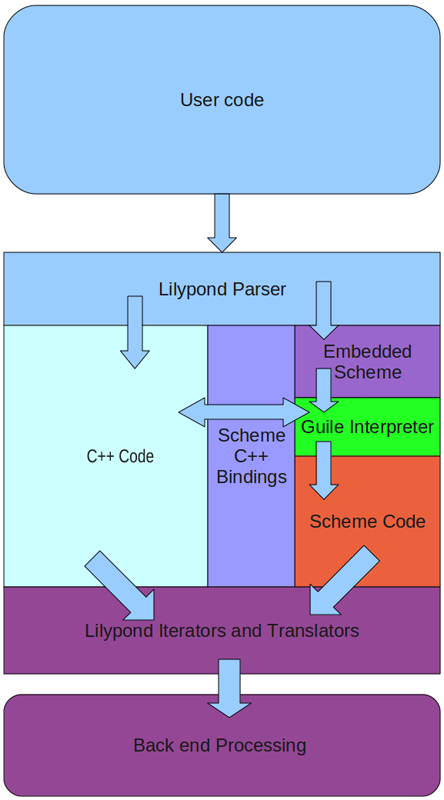| [ << Programming work ] | [Top][Contents] | [ Release work >> ] |
| [ < Programming work ] | [ Up : Programming work ] | [ LilyPond programming languages > ] |
10.1 Overview of LilyPond architecture
LilyPond processes the input file into graphical and musical output in a number of stages. This process, along with the types of routines that accomplish the various stages of the process, is described in this section. A more complete description of the LilyPond architecture and internal program execution is found in Erik Sandberg’s master’s thesis.
The first stage of LilyPond processing is parsing. In the parsing process, music expressions in LilyPond input format are converted to music expressions in Scheme format. In Scheme format, a music expression is a list in tree form, with nodes that indicate the relationships between various music events. The LilyPond parser is written in Bison.
The second stage of LilyPond processing is iterating. Iterating assigns each music event to a context, which is the environment in which the music will be finally engraved. The context is responsible for all further processing of the music. It is during the iteration stage that contexts are created as necessary to ensure that every note has a Voice type context (e.g. Voice, TabVoice, DrumVoice, CueVoice, MensuralVoice, VaticanaVoice, GregorianTranscriptionVoice), that the Voice type contexts exist in appropriate Staff type contexts, and that parallel Staff type contexts exist in StaffGroup type contexts. In addition, during the iteration stage each music event is assigned a moment, or a time in the music when the event begins.
Each type of music event has an associated iterator. Iterators are defined in ‘*-iterator.cc’. During iteration, an event’s iterator is called to deliver that music event to the appropriate context(s).
The final stage of LilyPond processing is translation. During translation, music events are prepared for graphical or midi output. The translation step is accomplished by the polymorphic base class Translator through its two derived classes: Engraver (for graphical output) and Performer (for midi output).
Translators are defined in C++ files named ‘*-engraver.cc’ and ‘*-performer.cc’. Much of the work of translating is handled by Scheme functions, which is one of the keys to LilyPond’s exceptional flexibility.

| [ << Programming work ] | [Top][Contents] | [ Release work >> ] |
| [ < Programming work ] | [ Up : Programming work ] | [ LilyPond programming languages > ] |